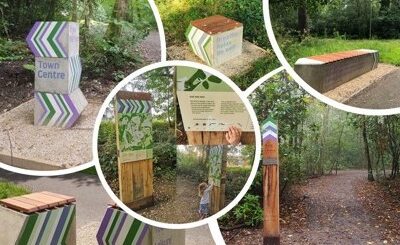Torridge District Council: Appledore Clean Maritime Innovation Centre
The project
Aspiration, youth opportunity / exodus and resulting low qualification rates have all long been highlighted as a key obstacle to economic and social growth in the northern Devon region, causing Catch-22 spirals of low-quality employment and low salaries which then feed into ongoing deprivation. Only proactive, skills focused projects which are appealing to inward investment from the private sector will be able to break this cycle. Which is where the potential economic benefit of floating offshore wind comes into play. The Crown Estate’s proposed initial four gigawatt of leases, stand to deliver in waters surrounded by some of the most deprived communities in Cornwall, South Wales and northern Devon, Torridge in particular.
The “blue economy” has long supported these places but it is often low-quality and seasonal, through fishing and tourism, and unattractive to many higher ability, aspirational young people, who are again pushed to leave to achieve their own goals. This is where the concept of the Appledore Clean Maritime Innovation Centre was developed into a project that has been awarded £15.6 million of government funding.
Expected to open in 2025, the centre will feature cutting-edge research and industry partnerships from the Centre for Future Clean Mobility (CFCM, University of Exeter) and the University of Plymouth. Flexibly designed innovation workshops and offices enable businesses to undertake sector-leading research and development in a collaborative, engaging atmosphere. Interest has been high. CFCM’s global-leading research into clean maritime propulsion will support the re-positioning of Appledore as a centre of excellence for clean-propulsion shipbuilding as the movement away from diesel intensifies over the next few years.
The project will also capitalise on the Crown Estate’s plans to develop floating offshore wind energy generation in the Celtic Sea, enough to power around three million homes. The Innovation Centre’s waterfront location next to the Harland & Wolff shipyard will create a unique mix of research, education, commercialisation and business development opportunities.
Alongside this and following the recent installation of northern Devon’s first seaweed farm, there has been significant interest to support the growing local seaweed sector- an industry predicted to be worth around €9 billion annually by 2030 across Europe. This includes the development of seaweed biproducts such as plastic replacements and pharmaceuticals, efforts which the University of Plymouth is ready to support.
A key role of the centre is to inspire the next generation of scientists and engineers, with dedicated space set aside for education and engagement activities. Working together with the two university research partners, Petroc College and staff within its university centre, will be driving a pipeline of courses to develop skills locally for roles in clean maritime, environmental management and preparing for the future green hydrogen deployment. Local educational initiatives will work in tandem with regional partners under the banner of the South West Institute of Technology (SWIoT).
Project development has been undertaken in partnership. Devon County Council funded the initial project feasibility. A successful collaboration with North Devon UNESCO Biosphere took place as part of the Community Renewal Fund. The project was successful in the second round of the Levelling Up Fund. It is receiving frequent enquiries about how and when businesses can get involved.
Partnerships on a variety of levels are being adopted to solve collective issues. For example, previously non-existent partnerships with universities and government agencies have developed to support the Levelling Up agenda. Also partnership with the private sector to deliver on genuine challenges facing industry. From concept through to design there has been a shared perspective making sure the work can flex and continue to deliver for the ever-growing global clean maritime needs. Yet it is also the nature of design which is innovative – utilising a range of renewable energy approaches to ensure future-proofing of provision.
The benefits
So far, the project has generated a lot of hope and is putting Appledore back on the maritime map. The potential for the centre has proved energising when engaging with schools and businesses. Investment enquiries into the wider economy have been stimulated, from green hydrogen to seaweed, building a momentum.
The £17 million project will deliver an innovation centre featuring offices and workshops. Crucially, this will provide a focus for floating offshore wind, and strengthen other clean maritime needs, from delivery of the National Shipbuilding Strategy through to boosting research and development opportunities for aquaculture, in particular the burgeoning seaweed bi-product markets. The objective is to deliver, and ensure the wider benefits are felt across the economy- from school curriculum to attracting community benefit investments through to opening up further economic development land and enabling green industries to then manufacture locally.






